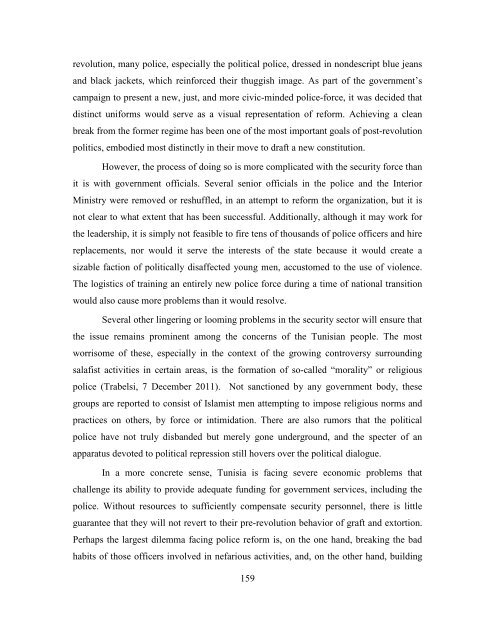Tunisia: Understanding Conflict 2012 - Johns Hopkins School of ...
Tunisia: Understanding Conflict 2012 - Johns Hopkins School of ...
Tunisia: Understanding Conflict 2012 - Johns Hopkins School of ...
Create successful ePaper yourself
Turn your PDF publications into a flip-book with our unique Google optimized e-Paper software.
evolution, many police, especially the political police, dressed in nondescript blue jeans<br />
and black jackets, which reinforced their thuggish image. As part <strong>of</strong> the government’s<br />
campaign to present a new, just, and more civic-minded police-force, it was decided that<br />
distinct uniforms would serve as a visual representation <strong>of</strong> reform. Achieving a clean<br />
break from the former regime has been one <strong>of</strong> the most important goals <strong>of</strong> post-revolution<br />
politics, embodied most distinctly in their move to draft a new constitution.<br />
However, the process <strong>of</strong> doing so is more complicated with the security force than<br />
it is with government <strong>of</strong>ficials. Several senior <strong>of</strong>ficials in the police and the Interior<br />
Ministry were removed or reshuffled, in an attempt to reform the organization, but it is<br />
not clear to what extent that has been successful. Additionally, although it may work for<br />
the leadership, it is simply not feasible to fire tens <strong>of</strong> thousands <strong>of</strong> police <strong>of</strong>ficers and hire<br />
replacements, nor would it serve the interests <strong>of</strong> the state because it would create a<br />
sizable faction <strong>of</strong> politically disaffected young men, accustomed to the use <strong>of</strong> violence.<br />
The logistics <strong>of</strong> training an entirely new police force during a time <strong>of</strong> national transition<br />
would also cause more problems than it would resolve.<br />
Several other lingering or looming problems in the security sector will ensure that<br />
the issue remains prominent among the concerns <strong>of</strong> the <strong>Tunisia</strong>n people. The most<br />
worrisome <strong>of</strong> these, especially in the context <strong>of</strong> the growing controversy surrounding<br />
salafist activities in certain areas, is the formation <strong>of</strong> so-called “morality” or religious<br />
police (Trabelsi, 7 December 2011). Not sanctioned by any government body, these<br />
groups are reported to consist <strong>of</strong> Islamist men attempting to impose religious norms and<br />
practices on others, by force or intimidation. There are also rumors that the political<br />
police have not truly disbanded but merely gone underground, and the specter <strong>of</strong> an<br />
apparatus devoted to political repression still hovers over the political dialogue.<br />
In a more concrete sense, <strong>Tunisia</strong> is facing severe economic problems that<br />
challenge its ability to provide adequate funding for government services, including the<br />
police. Without resources to sufficiently compensate security personnel, there is little<br />
guarantee that they will not revert to their pre-revolution behavior <strong>of</strong> graft and extortion.<br />
Perhaps the largest dilemma facing police reform is, on the one hand, breaking the bad<br />
habits <strong>of</strong> those <strong>of</strong>ficers involved in nefarious activities, and, on the other hand, building<br />
159
















